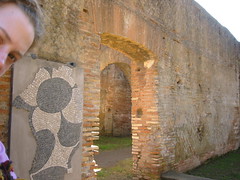My reading list for the summer was ridiculously unrealistic, then I changed it and it is still ridiculously unrealistic, so there's no point in putting it here. But I will say that I'm reading War and Peace and Suite Française and they make for interesting companion pieces. There's a scene in the latter that refers to a scene in the former, about troops and villagers crossing a bridge (and Suite Française, in case you don't know, is about Parisians trying to leave Paris in World War II), and I got a certain twinge of readerly satisfaction from having so recently read the scene the more contemporary characters were talking about. The same sort of intersection gave me a similar twinge a couple of years ago when I was reading The Travels of Marco Polo (which I still haven't finished) and The Decameron (...also unfinished, for shame...) and both mentioned the same story of an old monk in a cave, this time without making direct reference to predecessors. I love picking up two books, supposedly at random, and finding those connections across centuries. Seeing the reference in the more contemporary World War II novel somehow made the wartime scene in Tolstoy more powerful, for being still relevant, and also had an ironic effect on the character speaking about the scene, who didn't yet experience fleeing Paris and didn't seem to take that prospect seriously.
On that intertextual note, here's another little piece I wrote this past quarter extending the myth of Prosperine. (The extension part begins with "In Hades..." and everything that precedes it is just to refresh your memory about what went down in that story.)
-------------------------------------------------------------------------------
Ceres implored Jove to return Proserpine to her. Jove replied that Proserpine may return, so long as she has not eaten anything in the underworld. But Pluto had given Proserpine seeds of the pomegranate, and she had eaten those glistening seeds, so she was bound to spend part of the year in Hades and part of the year on Earth.
So, the months she spent in Hades became our autumn and winter, full of thistles and bramble and numbing snow. And the months she returned allowed us spring and summer-- cherry blossoms and dogwoods, blackberries and huckleberries and rosy-hued nectarines and black plums.
In Hades Proserpine was dulled by dark winter. Pomegranates, with their juicy red-jeweled, bitter-centered seeds, were still on offer. Pluto sliced open this fruit and offered her a further wedge. Proserpine hesitated, tempted by this momentary distraction from underworld tedium.
“I want you to enjoy your time here,” Pluto said, still struck by Cupid’s quiver, still enraptured by Proserpine. “Please enjoy this fruit.”
“I can’t,” said Proserpine. “I know I’ll be further bound to this place. I know what will happen.”
“I’ll use my powers to prevent it. Longer summers, more lush vegetation. I promise.”
Proserpine knew that Pluto, struck by Cupid’s quiver, would keep his promise. She ate another wedge of pomegranate seeds.
Above, a confused Ceres watched the oceans rise.
Above, a confused Ceres watched the oceans rise.

No comments:
Post a Comment